Returning to the beautifully messy, Marvel Cinematic Universe-adjacent world of the Agents of S.H.I.E.L.D. for a seventh and final season is already proving to be a wild and unpredictable ride, filled with plenty of fun character beats, clever jokes and even a couple of callbacks. Already, the story is moving along at a better pace than season 6, though it also appears to be suffering from a couple of that season’s same problems. As the Agents move backwards through time and space to try and prevent a hostile alien takeover of S.H.I.E.L.D., they encounter a wide variety of characters – some taken straight from the pages of Marvel comics, others borrowed from history books – along with a number of uniquely dangerous scenarios that require them to be on top of their game.
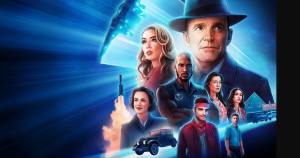
Unfortunately for the team, their leader and only guide through the past is currently having something of an identity crisis. As you may remember from the season 6 finale, the team made a decision to resurrect the recently deceased Agent Phil Coulson (Clark Gregg) by planting his preserved consciousness into the synthetic body of an LMD robot. And though our first glimpse of LMD Coulson was as his smiling, chipper old self, it quickly becomes apparent that all is not well with him – Coulson, despite agreeing to help the Agents of S.H.I.E.L.D. one last time, is clearly angry at them for bringing him back from the dead: it’s been a recurring problem for his character, as the other S.H.I.E.L.D. members (and, ahem, the showrunners) can’t seem to let him rest in peace. LMD Coulson is seen struggling through panic attacks as his old memories flood his systems with past pain, trauma and guilt. He also ominously tells Director “Mack” (Henry Simmons) that when all is said and done, he will “reevaluate” the situation – dialogue that seems to forewarn more trouble for his character in the near future. It’s easy to imagine that everything will come down to his choice whether or not to die and stay dead – already, the premiere is hinting at possible conflict as LMD Coulson remarks during fight scenes that being a nearly indestructible robot has its perks after all, and he seems very happy being back in his element, leading the Agents of S.H.I.E.L.D. on a romp around 1930’s New York City, fanboying over historical figures and relishing the opportunity to dabble in the origins of S.H.I.E.L.D.
Apparently, not too much dabbling is strictly allowed by the rules of the series’ time travel mechanism, which appears to be rather different than the one presented in Avengers: Endgame. Though it hasn’t been explicitly stated what will happen if the Agents mess with historical events, everyone – and particularly super-genius Jemma Simmons (Elizabeth Henstridge) – strongly advises against it. In Endgame, tampering with history didn’t really matter too much, since the Avengers were simply creating alternate realities with every Infinity Stone they stole and every character they accidentally almost killed.
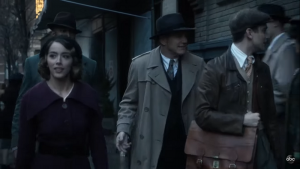
As one would expect, however, the Agents of S.H.I.E.L.D. don’t really have much of a choice when it comes to changing history, as they find themselves in a number of predicaments that require drastic measures. Surprisingly however, it’s not the team’s newest recruit, time-traveling business entrepreneur Deke Shaw (Jeff Ward) who causes these predicaments (despite Mack specifically singling him out and ordering him not to try and file any patents in the past), but rather one of the team’s most senior members, Daisy Johnson (Chloe Bennet). Johnson was somewhat sidelined in the sixth season, but here she is already back in form – even encumbered by an impractical dress, she still has excellent fight scenes, making ample use of her Inhuman powers, and her confident wittiness provides a nice foil to Coulson’s steady flow of awkwardly timed “dad jokes”.
The members of the team who actually get to wander through the streets of Great Depression-era New York – Coulson, Daisy, Mack and Deke – also get a much-needed makeover, trading in their sleek black S.H.I.E.L.D. uniforms for historically-accurate outfits, haircuts and accessories. Daisy complains about having to get rid of her purple highlights, but her resulting 30’s look, complete with delicate white gloves and a fancy fur stole is far and away the premiere’s best. Mack comes closest to matching her retro vibes, though he himself notes that the sight of “a black man in a fine suit” attracts more attention from passerby than he had hoped.
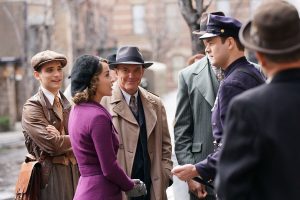
The action back on the team’s ship is significantly less interesting and much less stylish, but Agent “Yo Yo” Rodriguez (Natalia Cordova-Buckley) has a number of touching, heartfelt moments while debating whether she wants to even try and fit in with the times if it means having to hide her mechanical arms, which she had grown to accept and be proud of, behind new, eerily life-like prosthetics. But for the most part, she and Simmons are forced to stand around and watch while the helpful Chronicom Enoch (Joel Stoffer) patches up Melinda May‘s (Ming-Na Wen) wounds from the season 6 finale.
A few other characters show up and either help or hinder the heroes’ journey. In particular, I have to give a shoutout to Patton Oswalt, who returns to the series to reprise his role as Koenig, the mysterious man with a seemingly endless number of identical siblings. Here going by the very appropriate codename “Gemini” and working as the proprietor of a speakeasy, this Koenig bears little resemblance to his descendants (apart from, you know, being identical to them): he’s rude, demanding, and a bit sexist. But he also hires a young man named Freddy (Darren Barnet), who proves to be of much greater significance to the story than one would guess.
And that’s my cue to start talking SPOILERS!, so if you haven’t seen the episode, turn back now.
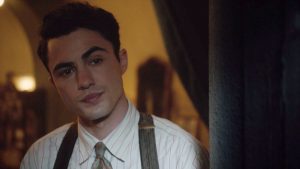
Yes, as it turns out, the Freddy who is working as a waiter at Koenig’s bar is in fact Wilfred Malick, a.k.a. one of the key members of HYDRA, the organization that would go on to infiltrate S.H.I.E.L.D. soon after its foundation and, eventually, rip it apart from the inside – and it’s Freddy who is the reason why the Chronicoms have invaded 1931. But as Coulson and Daisy realize at the very end of the episode (in an exchange which, unfortunately, was already revealed in the trailers), the Agents of S.H.I.E.L.D. now have to save HYDRA in order to save S.H.I.E.L.D., because without the one, the other cannot exist. The symbiotic relationship between the two covert groups has never been more fascinating.
But watching S.H.I.E.L.D. history unfold in front of our eyes is twice as much fun when its intertwined with real history – and Agents Of S.H.I.E.L.D. perfectly mingles the two by leading Coulson and his team on a red herring mission to rescue then-Governor of New York Franklin Delano Roosevelt (Joseph Culp) from what they mistakenly believe to be an assassination attempt by the Chronicom aliens. Though they quickly realize they’ve made a mistake, they fortunately get to have a delightful little conversation with Roosevelt (who, in Marvel canon, founded the organization that would later become S.H.I.E.L.D.). It’s heartwarming to see how much the team idolizes him – in particular Coulson, who ends up helping the Governor into a wheelchair and is subsequently sworn to secrecy.
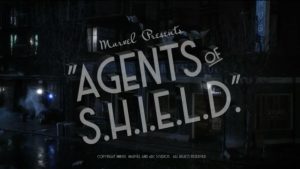
The episode’s biggest weakness is the Chronicoms themselves: the emotionless alien lifeforms whose mission to root their opponents out of history still feels pretty vague – tying everything back to the irreversible connection between S.H.I.E.L.D. and HYDRA is the right call, as the series began with that and ultimately should end with it as well: I just wish we didn’t have the Chronicoms right in the middle of the conflict, as I don’t know whether this thirteen-episode season will be able to balance so many storylines. Now, substitute the Chronicoms for the Kree and then I might reconsider, because at least the Kree have had connections to S.H.I.E.L.D. for a very long time – but these aliens, with their face-stealing technology and imperfect attempts at replicating humanity, feel very random. All except Enoch, who doesn’t really seem to have much stake (if any) in the fight between his civilization and the human race.
The episode’s last-minute stinger, however, brings the focus back to Enoch – though only as a way of showing us that Melinda May, who had been unconscious for the entire episode, is awake, and has escaped from her hyperbaric chamber. Judging by the glimpse of her face that we get as she watches Enoch from where she’s hiding in the ceiling fixtures, it looks like she’s having some issues of her own – she probably hasn’t quite gotten over the experience of being tossed through a portal into a demon dimension just yet. But as much as I’d love to see her deal with that pain as slowly as she needs to, I also don’t want the series to spend any more time addressing things from season 6 than it absolutely has to, if that’s at all possible. Even the mere mention of the Shrikes from last season made me want to cringe.
Overall, I hope the final season can improve. I had fun with this episode – the writing was good, and characteristically clever, but the heart wasn’t fully there. I want episodes that focus heavily on character development, rather than on time-travel mechanics and Chronicom politics. Namely, what I don’t want is another season 6: a season that gets so wrapped up in trying to outdo everything that’s come before, that it forgets to be fun and exciting. At the moment, season 7 could still go either way.
Episode Rating: 6/10